2014本科函授复习题
- 格式:doc
- 大小:224.00 KB
- 文档页数:26
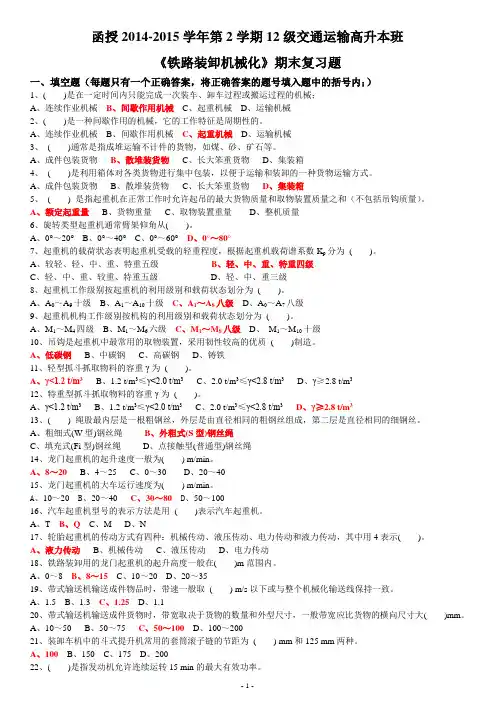
函授2014-2015学年第2学期12级交通运输高升本班《铁路装卸机械化》期末复习题一、填空题(每题只有一个正确答案,将正确答案的题号填入题中的括号内;)1、( )是在一定时间内只能完成一次装车、卸车过程或搬运过程的机械;A、连续作业机械B、间歇作用机械C、起重机械D、运输机械2、( )是一种间歇作用的机械,它的工作特征是周期性的。
A、连续作业机械B、间歇作用机械C、起重机械D、运输机械3、( )通常是指成堆运输不计件的货物,如煤、砂、矿石等。
A、成件包装货物B、散堆装货物C、长大笨重货物D、集装箱4、( )是利用箱体对各类货物进行集中包装,以便于运输和装卸的一种货物运输方式。
A、成件包装货物B、散堆装货物C、长大笨重货物D、集装箱5、( ) 是指起重机在正常工作时允许起吊的最大货物质量和取物装置质量之和(不包括吊钩质量)。
A、额定起重量B、货物重量C、取物装置重量D、整机质量6、旋转类型起重机通常臂架仰角从( )。
A、0°~20°B、0°~40°C、0°~60°D、0°~80°7、起重机的载荷状态表明起重机受载的轻重程度,根据起重机载荷谱系数K p分为( )。
A、较轻、轻、中、重、特重五级B、轻、中、重、特重四级C、轻、中、重、较重、特重五级D、轻、中、重三级8、起重机工作级别按起重机的利用级别和载荷状态划分为( )。
A、A0~A9十级B、A1~A10十级C、A1~A8八级D、A0~A7八级9、起重机机构工作级别按机构的利用级别和载荷状态划分为( )。
A、M1~M4四级B、M1~M6六级C、M1~M8八级D、M1~M10十级10、吊钩是起重机中最常用的取物装置,采用韧性较高的优质( )制造。
A、低碳钢B、中碳钢C、高碳钢D、铸铁11、轻型抓斗抓取物料的容重γ为( )。
A、γ<1.2 t/m3B、1.2 t/m3≤γ<2.0 t/m3C、2.0 t/m3≤γ<2.8 t/m3D、γ≥2.8 t/m312、特重型抓斗抓取物料的容重γ为( )。
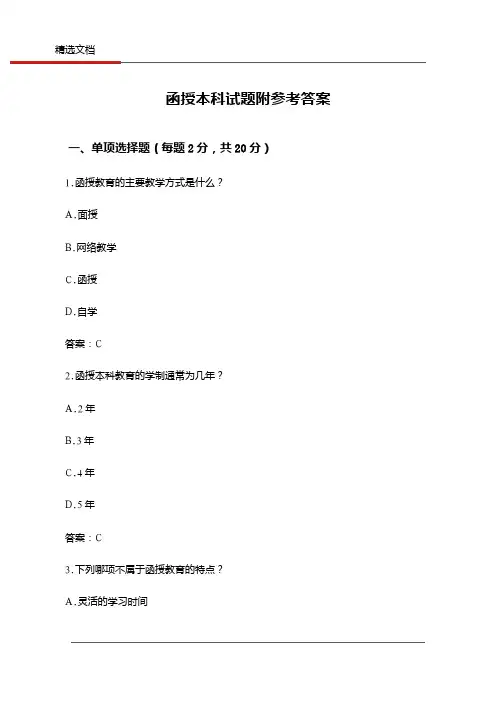
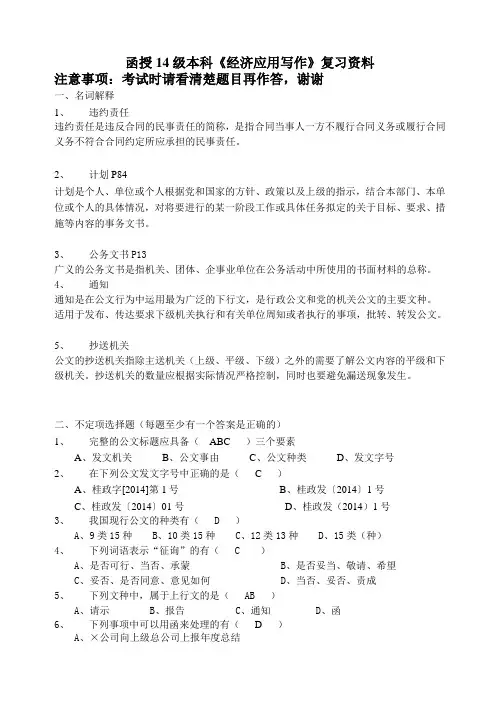
函授14级本科《经济应用写作》复习资料注意事项:考试时请看清楚题目再作答,谢谢一、名词解释1、违约责任违约责任是违反合同的民事责任的简称,是指合同当事人一方不履行合同义务或履行合同义务不符合合同约定所应承担的民事责任。
2、计划P84计划是个人、单位或个人根据党和国家的方针、政策以及上级的指示,结合本部门、本单位或个人的具体情况,对将要进行的某一阶段工作或具体任务拟定的关于目标、要求、措施等内容的事务文书。
3、公务文书P13广义的公务文书是指机关、团体、企事业单位在公务活动中所使用的书面材料的总称。
4、通知通知是在公文行为中运用最为广泛的下行文,是行政公文和党的机关公文的主要文种。
适用于发布、传达要求下级机关执行和有关单位周知或者执行的事项,批转、转发公文。
5、抄送机关公文的抄送机关指除主送机关(上级、平级、下级)之外的需要了解公文内容的平级和下级机关。
抄送机关的数量应根据实际情况严格控制,同时也要避免漏送现象发生。
二、不定项选择题(每题至少有一个答案是正确的)1、完整的公文标题应具备(ABC )三个要素A、发文机关B、公文事由C、公文种类D、发文字号2、在下列公文发文字号中正确的是( C )A、桂政字[2014]第1号B、桂政发〔2014〕1号C、桂政发〔2014〕01号D、桂政发(2014)1号3、我国现行公文的种类有( D )A、9类15种B、10类15种C、12类13种D、15类(种)4、下列词语表示“征询”的有( C )A、是否可行、当否、承蒙B、是否妥当、敬请、希望C、妥否、是否同意、意见如何D、当否、妥否、责成5、下列文种中,属于上行文的是( AB )A、请示B、报告C、通知D、函6、下列事项中可以用函来处理的有( D )A、×公司向上级总公司上报年度总结B、×县纪委拟向市委汇报某重大案件查处情况C、×市教育局向所属学校公布初中毕业生统考时间及要求D、×县人事局拟撰文请求该县财政局拨给××考试办公费7、下列事项中可用“请示”行文的有(AE )A、××县农业局向该县政府行文请求解决抗旱保栽的资金B、××县民政局行文向上级县政府汇报对扶贫救灾物质分配处置情况C、××省财政厅向省政府汇报对省级机关预算外收入资金进行检查的情况D、××市劳动局行文答复市人大对下岗职工再就业状况的质询E、××省公安厅行文请求上级机关拨款购置巡逻用车8、计划标题的常规写法包括的要素有( A )A、单位名称B、文种C、适用时间D、指向事务9、下列公文成文时间表述正确的是( D )A、09年5月5日B、○九年五月五日C、2009年5月5日D、二○○九年五月五日10、下列项目中属于公文成文必备项目的是( ACD )A、发文字号B、抄送机关C、成文时间D、印章11、应用文的表达方式主要是( B )A、叙述为主B、叙述、议论和说明C、议论和叙述D、叙述和说明12、公文附件的标注位置是(A)A、正文之后,成文时间之前B、成文时间之后,抄送机关之前C、印发机关和印发日期之后D、签发人之后13、下列事项中可以制发通知的有(BCE )A、××公司拟招聘一名营业员B、××银行拟向其下属各储蓄所下达季度储蓄任务C、××市教育局向所属学校公布初中毕业生统考时间及要求D、××公司答复另一个公司的来文E、××机关拟将自己收到的上级机关公文转发给其下级机关14、下列不属于计划类文书的是( B )A、方案B、竞聘书C、设想D、打算15、公文的紧急程度分为(AD )A、特急B、火急C、加急D、急件三、判断题(对的打√,错的打×。
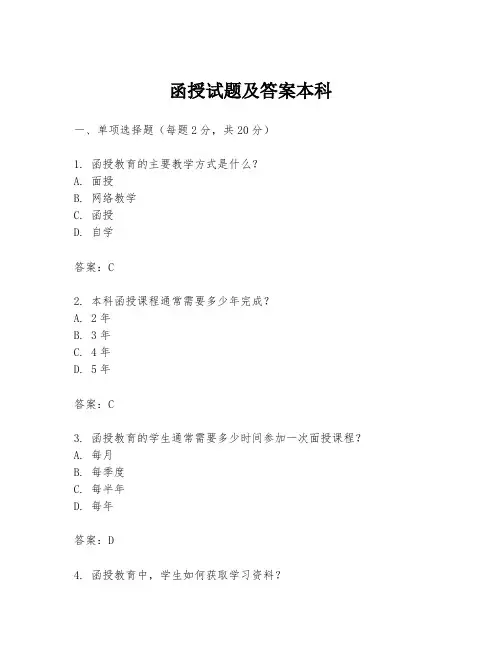
函授试题及答案本科一、单项选择题(每题2分,共20分)1. 函授教育的主要教学方式是什么?A. 面授B. 网络教学C. 函授D. 自学答案:C2. 本科函授课程通常需要多少年完成?A. 2年B. 3年C. 4年D. 5年答案:C3. 函授教育的学生通常需要多少时间参加一次面授课程?A. 每月B. 每季度C. 每半年D. 每年答案:D4. 函授教育中,学生如何获取学习资料?A. 通过邮寄B. 通过电子邮件C. 通过在线下载D. 通过面授课程答案:A5. 函授教育的学生通常如何进行考试?A. 在线考试B. 邮寄试卷C. 面授考试D. 视频监控考试答案:B6. 函授教育的优势之一是什么?A. 灵活性B. 经济性C. 社交性D. 互动性答案:A7. 函授教育的学位证书与全日制教育的学位证书有何区别?A. 没有区别B. 函授教育的学位证书上会注明“函授”C. 函授教育的学位证书含金量低D. 函授教育的学位证书不被认可答案:B8. 函授教育适合哪些人群?A. 学生B. 工作繁忙的在职人员C. 家庭主妇D. 所有人群答案:B9. 函授教育中,学生如何获得学习指导?A. 通过在线论坛B. 通过电子邮件C. 通过电话咨询D. 通过面授课程答案:A10. 函授教育的学费通常比全日制教育的学费如何?A. 更高B. 相同C. 较低D. 无法比较答案:C二、多项选择题(每题3分,共15分)1. 函授教育的组成部分包括以下哪些方面?A. 学习资料的邮寄B. 定期的面授课程C. 在线学习平台D. 定期的考试答案:A、B、C、D2. 函授教育中,学生可能需要提交哪些类型的作业?A. 论文B. 实验报告C. 项目设计D. 课堂笔记答案:A、B、C3. 函授教育的学生如何与教师进行互动?A. 通过电子邮件B. 通过在线论坛C. 通过电话D. 通过面授课程答案:A、B、C、D4. 函授教育的劣势可能包括哪些?A. 缺乏面对面的互动B. 学习进度可能较慢C. 需要较强的自律性D. 缺乏实践机会答案:A、B、C、D5. 函授教育适合哪些类型的课程?A. 理论课程B. 实践课程C. 研究型课程D. 技能培训课程答案:A、B、C三、简答题(每题5分,共20分)1. 请简述函授教育的定义及其特点。
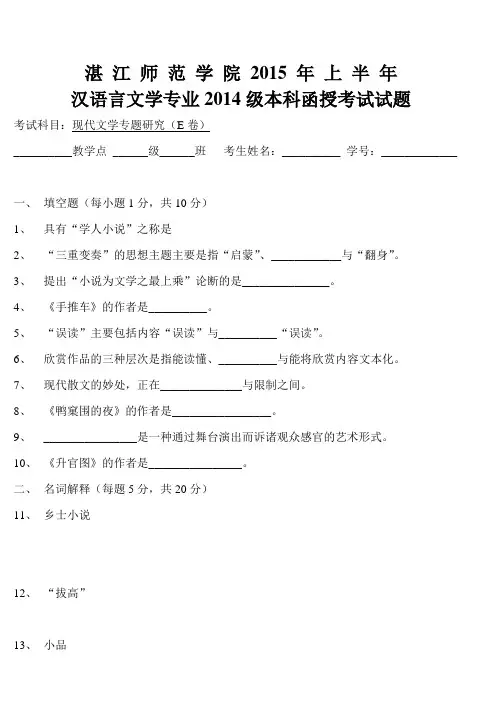
湛江师范学院2015 年上半年汉语言文学专业2014级本科函授考试试题考试科目:现代文学专题研究(E卷)__________教学点______级______班考生姓名:__________ 学号:_____________一、填空题(每小题1分,共10分)1、具有“学人小说”之称是2、“三重变奏”的思想主题主要是指“启蒙”、____________与“翻身”。
3、提出“小说为文学之最上乘”论断的是_______________。
4、《手推车》的作者是__________。
5、“误读”主要包括内容“误读”与__________“误读”。
6、欣赏作品的三种层次是指能读懂、__________与能将欣赏内容文本化。
7、现代散文的妙处,正在______________与限制之间。
8、《鸭窠围的夜》的作者是_________________。
9、________________是一种通过舞台演出而诉诸观众感官的艺术形式。
10、《升官图》的作者是________________。
二、名词解释(每题5分,共20分)11、乡士小说12、“拔高”13、小品14、《子夜》三、简答题(每题6分,共24分)15、“新海派”包括哪几类作家?16、现代诗歌的一般特征有哪些?17、散文的“限制”包括哪些方面?18、戏剧有哪些文体特征?四、论述题(每题13分,共26分)19、为什么说“性格小说”在现代小说中独占鳖头?20、现实主义思潮及其小说创作如何成为现代文学的主潮?五、案例分析题(20分)21、《我是一条河》的思想意蕴与艺术特色。
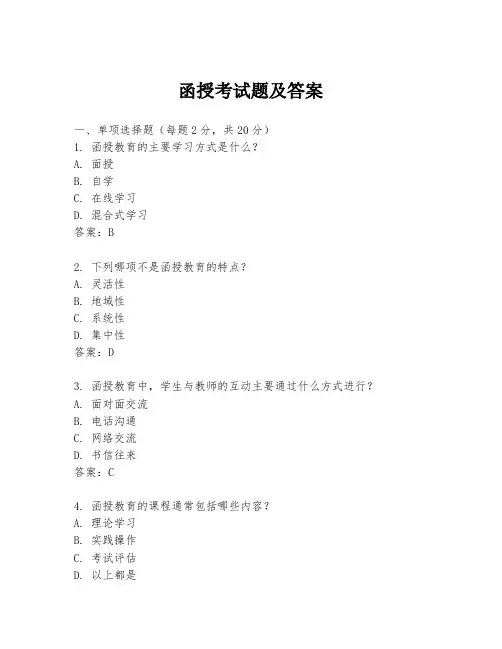
函授考试题及答案一、单项选择题(每题2分,共20分)1. 函授教育的主要学习方式是什么?A. 面授B. 自学C. 在线学习D. 混合式学习答案:B2. 下列哪项不是函授教育的特点?A. 灵活性B. 地域性C. 系统性D. 集中性答案:D3. 函授教育中,学生与教师的互动主要通过什么方式进行?A. 面对面交流B. 电话沟通C. 网络交流D. 书信往来答案:C4. 函授教育的课程通常包括哪些内容?A. 理论学习B. 实践操作C. 考试评估D. 以上都是5. 函授教育的考试通常采用什么形式?A. 开卷考试B. 闭卷考试C. 论文答辩D. 项目报告答案:B6. 函授教育的学历认证是由哪个机构负责?A. 教育部B. 人力资源和社会保障部C. 国家开放大学D. 地方教育厅答案:A7. 函授教育的学习周期通常为多久?A. 1年B. 2年C. 3年D. 4年答案:C8. 函授教育的学生需要定期参加哪些活动?A. 线上讨论B. 线下聚会C. 定期考试D. 以上都是答案:D9. 函授教育中,学生如何获得学习资料?B. 电子下载C. 现场领取D. 以上都是答案:D10. 函授教育的毕业证书与全日制教育的毕业证书有何不同?A. 无不同B. 函授证书上会注明“函授”C. 函授证书含金量较低D. 函授证书不被认可答案:B二、多项选择题(每题3分,共15分)11. 函授教育的优势包括哪些?A. 节省时间B. 节省费用C. 灵活性高D. 社交机会多答案:ABC12. 函授教育中,学生可能面临的挑战有哪些?A. 自律要求高B. 缺乏面对面交流C. 学习资源有限D. 考试难度大答案:ABC13. 函授教育中,学生需要掌握哪些技能?A. 时间管理B. 自主学习C. 信息技术应用D. 团队协作答案:ABC14. 函授教育的课程设计通常包含哪些要素?A. 课程大纲B. 学习目标C. 作业与评估D. 教学计划答案:ABCD15. 函授教育的学历认证需要满足哪些条件?A. 完成规定学分B. 通过所有考试C. 完成毕业论文D. 获得实习证明答案:ABC三、判断题(每题1分,共10分)16. 函授教育只适合在职人员。
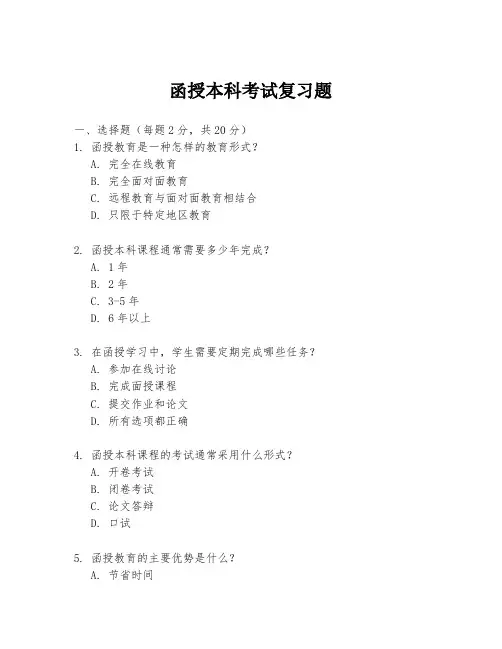
函授本科考试复习题一、选择题(每题2分,共20分)1. 函授教育是一种怎样的教育形式?A. 完全在线教育B. 完全面对面教育C. 远程教育与面对面教育相结合D. 只限于特定地区教育2. 函授本科课程通常需要多少年完成?A. 1年B. 2年C. 3-5年D. 6年以上3. 在函授学习中,学生需要定期完成哪些任务?A. 参加在线讨论B. 完成面授课程C. 提交作业和论文D. 所有选项都正确4. 函授本科课程的考试通常采用什么形式?A. 开卷考试B. 闭卷考试C. 论文答辩D. 口试5. 函授教育的主要优势是什么?A. 节省时间B. 节省费用C. 灵活的学习时间D. 所有选项都是6. 函授教育适合哪些人群?A. 学生B. 工作人士C. 家庭主妇D. 所有选项都正确7. 函授本科课程中,学生通常需要多少学分才能毕业?A. 60-80学分B. 80-100学分C. 100-120学分D. 120学分以上8. 函授教育的学位证书与全日制教育的学位证书有何不同?A. 函授教育的学位证书含金量较低B. 函授教育的学位证书在某些行业不被认可C. 函授教育的学位证书与全日制教育的学位证书完全相同D. 函授教育的学位证书通常需要额外的认证9. 在函授教育中,学生如何与教师进行沟通?A. 通过电子邮件B. 通过电话C. 通过在线平台D. 所有选项都正确10. 函授教育中,学生如何评估自己的学习进度?A. 通过定期的自我测试B. 通过教师的反馈C. 通过在线学习管理系统D. 所有选项都正确二、简答题(每题10分,共30分)1. 简述函授教育的特点及其在现代教育中的重要性。
2. 描述函授本科课程的学习流程,包括注册、选课、学习、考试和毕业等环节。
3. 阐述函授教育中,学生如何平衡工作、学习和个人生活。
三、论述题(每题25分,共50分)1. 论述函授教育与传统全日制教育在教学方法、学习资源和学生支持系统方面的异同。
2. 分析函授教育在促进终身学习和个人发展方面的作用,以及它如何帮助学生适应快速变化的社会和工作环境。
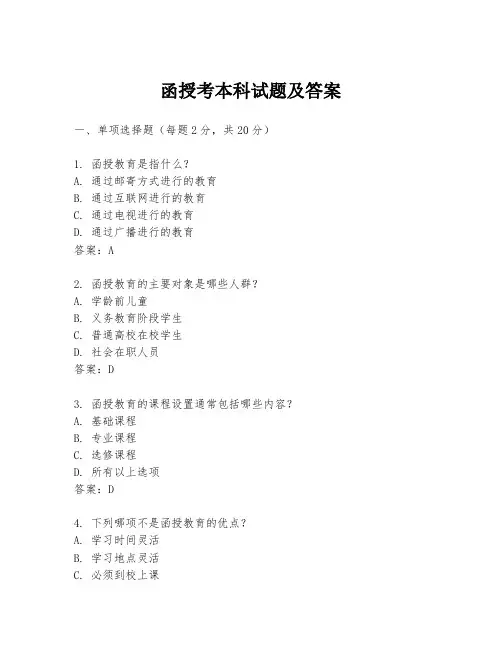
函授考本科试题及答案一、单项选择题(每题2分,共20分)1. 函授教育是指什么?A. 通过邮寄方式进行的教育B. 通过互联网进行的教育C. 通过电视进行的教育D. 通过广播进行的教育答案:A2. 函授教育的主要对象是哪些人群?A. 学龄前儿童B. 义务教育阶段学生C. 普通高校在校学生D. 社会在职人员答案:D3. 函授教育的课程设置通常包括哪些内容?A. 基础课程B. 专业课程C. 选修课程D. 所有以上选项答案:D4. 下列哪项不是函授教育的优点?A. 学习时间灵活B. 学习地点灵活C. 必须到校上课D. 可以自主选择课程答案:C5. 函授教育的考试通常采用什么形式?A. 现场笔试B. 线上考试C. 面试D. 所有以上选项答案:D二、多项选择题(每题3分,共15分)1. 函授教育的课程资源通常包括哪些?A. 教材B. 视频资料C. 在线讨论D. 面授辅导答案:ABCD2. 函授教育的学习方式有哪些?A. 自主学习B. 集体讨论C. 网络互动D. 现场实践答案:ABC3. 函授教育的考核方式可能包括哪些?A. 期中考试B. 期末考试C. 课程论文D. 实践报告答案:ABCD三、简答题(每题5分,共20分)1. 简述函授教育的特点。
答案:函授教育具有学习时间灵活、学习地点灵活、可以自主选择课程等特点,主要面向社会在职人员,通过邮寄、互联网、电视或广播等方式进行教育活动。
2. 函授教育与传统全日制教育相比有哪些优势?答案:函授教育的优势包括学习时间地点灵活,能够适应在职人员的学习需求;课程资源丰富,可以自主选择;考试形式多样,便于在职人员参与。
四、论述题(每题10分,共20分)1. 论述函授教育在现代社会中的作用和意义。
答案:函授教育在现代社会中起到了重要的桥梁作用,它为在职人员提供了继续教育的机会,有助于提高个人素质和专业技能,同时也促进了终身学习的理念。
此外,函授教育还有助于缓解教育资源的不均衡,使得更多人能够接受高等教育。
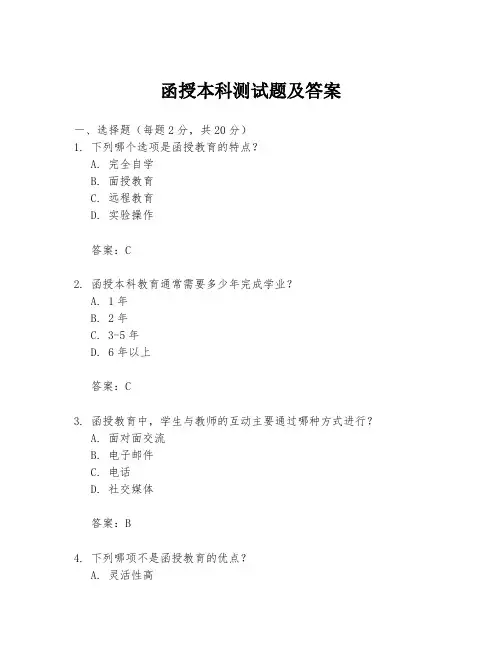
函授本科测试题及答案一、选择题(每题2分,共20分)1. 下列哪个选项是函授教育的特点?A. 完全自学B. 面授教育C. 远程教育D. 实验操作答案:C2. 函授本科教育通常需要多少年完成学业?A. 1年B. 2年C. 3-5年D. 6年以上答案:C3. 函授教育中,学生与教师的互动主要通过哪种方式进行?A. 面对面交流B. 电子邮件C. 电话D. 社交媒体答案:B4. 下列哪项不是函授教育的优点?A. 灵活性高B. 节省时间C. 必须全日制D. 资源丰富答案:C5. 函授本科教育的学历是否被国家承认?A. 是B. 否C. 部分承认D. 完全不承认答案:A6. 函授教育中,学生通常如何提交作业?A. 纸质邮寄B. 电子版上传C. 课堂提交D. 口头报告答案:B7. 函授教育的考试形式通常包括哪些?A. 开卷考试B. 闭卷考试C. 在线考试D. 所有以上答案:D8. 下列哪项不是选择函授教育的原因?A. 工作繁忙B. 地理位置偏远C. 喜欢集体学习D. 学习时间不固定答案:C9. 函授教育的学费通常与全日制教育相比如何?A. 更高B. 相同C. 较低D. 没有可比性答案:C10. 函授教育的学生通常需要具备哪种能力?A. 团队协作能力B. 自主学习能力C. 实验操作能力D. 公共演讲能力答案:B二、填空题(每题2分,共20分)11. 函授教育是一种以_____为主要教学手段的教育形式。
答案:通信12. 函授本科教育的课程设置通常包括专业课程和_____课程。
答案:公共基础13. 函授教育的学生可以通过_____来获取学习资料。
答案:网络14. 函授教育的考试通常由_____组织。
答案:教育机构或学校15. 函授教育的学生需要定期提交_____以证明学习进度。
答案:作业或论文16. 函授教育的学生在完成学业后,可以获得_____证书。
答案:毕业17. 函授教育适合那些无法参加全日制教育的_____。
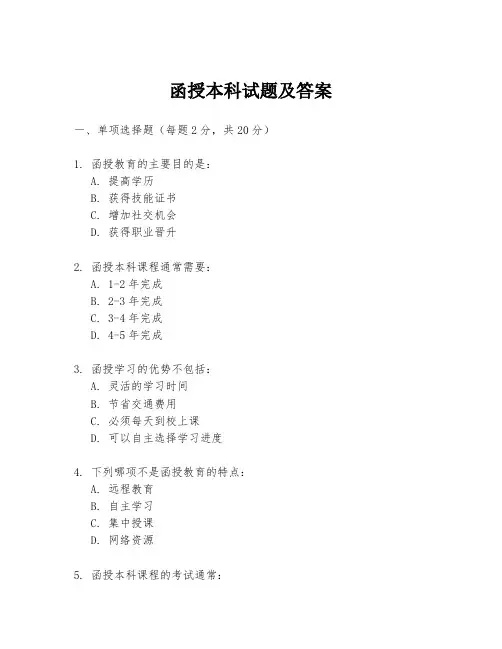
函授本科试题及答案一、单项选择题(每题2分,共20分)1. 函授教育的主要目的是:A. 提高学历B. 获得技能证书C. 增加社交机会D. 获得职业晋升2. 函授本科课程通常需要:A. 1-2年完成B. 2-3年完成C. 3-4年完成D. 4-5年完成3. 函授学习的优势不包括:A. 灵活的学习时间B. 节省交通费用C. 必须每天到校上课D. 可以自主选择学习进度4. 下列哪项不是函授教育的特点:A. 远程教育B. 自主学习C. 集中授课D. 网络资源5. 函授本科课程的考试通常:A. 每学期一次B. 每学年一次C. 每季度一次D. 每年两次6. 函授教育中,学生与教师的互动主要通过:A. 面对面交流B. 电子邮件C. 电话咨询D. 社交媒体7. 函授本科课程的教材通常:A. 仅提供电子版B. 仅提供纸质版C. 提供电子版和纸质版D. 不提供教材8. 函授教育的学位证书:A. 与全日制教育相同B. 与全日制教育不同C. 仅在特定领域有效D. 不被社会认可9. 函授本科课程的学习资源通常包括:A. 仅课本B. 仅网络资源C. 课本和网络资源D. 课本、网络资源和视频教程10. 函授本科课程的学费通常:A. 低于全日制教育B. 高于全日制教育C. 与全日制教育相同D. 根据学校不同而不同二、简答题(每题10分,共40分)1. 请简述函授教育与传统全日制教育的主要区别。
2. 函授本科课程的学习过程中,学生如何确保自己的学习效果?3. 在函授教育中,学生如何有效地利用网络资源进行学习?4. 函授本科课程的考试形式通常是怎样的?请举例说明。
三、论述题(每题20分,共40分)1. 论述函授教育在现代社会中的重要性及其对个人职业发展的影响。
2. 请结合个人经验,谈谈函授本科课程给你带来的挑战和收获。
参考答案:一、单项选择题1-5:ACBDA6-10:BCCAD二、简答题1. 函授教育与传统全日制教育的主要区别在于学习方式、时间安排、互动方式和资源获取等方面。
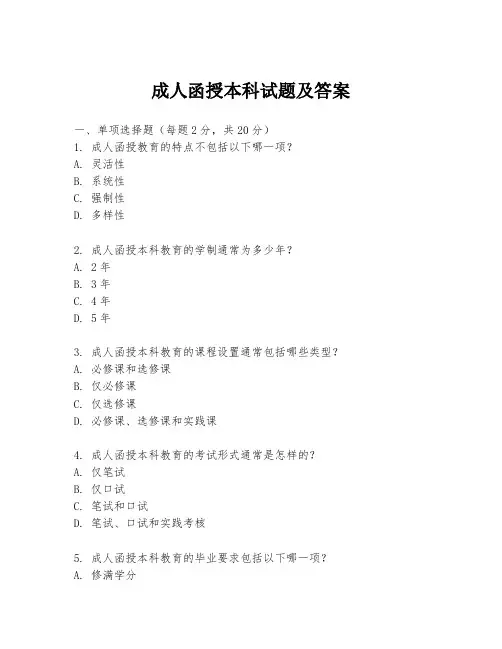
成人函授本科试题及答案一、单项选择题(每题2分,共20分)1. 成人函授教育的特点不包括以下哪一项?A. 灵活性B. 系统性C. 强制性D. 多样性2. 成人函授本科教育的学制通常为多少年?A. 2年B. 3年C. 4年D. 5年3. 成人函授本科教育的课程设置通常包括哪些类型?A. 必修课和选修课B. 仅必修课C. 仅选修课D. 必修课、选修课和实践课4. 成人函授本科教育的考试形式通常是怎样的?A. 仅笔试B. 仅口试C. 笔试和口试D. 笔试、口试和实践考核5. 成人函授本科教育的毕业要求包括以下哪一项?A. 修满学分B. 通过毕业论文C. 参加实习D. 所有选项6. 成人函授本科教育的学生通常需要具备哪些条件?A. 高中毕业或同等学历B. 大学专科毕业C. 无需任何学历D. 硕士毕业7. 成人函授本科教育的授课方式通常是怎样的?A. 全面面授B. 全面在线C. 面授与在线结合D. 仅通过邮件8. 成人函授本科教育的学费通常是怎样的?A. 与全日制本科相同B. 低于全日制本科C. 高于全日制本科D. 根据个人情况而定9. 成人函授本科教育的学生通常需要完成哪些学习任务?A. 课堂学习B. 自主学习C. 团队合作D. 所有选项10. 成人函授本科教育的学历认证是怎样的?A. 与全日制本科相同B. 低于全日制本科C. 高于全日制本科D. 无认证二、多项选择题(每题3分,共15分)1. 成人函授本科教育的优势包括以下哪些方面?A. 学习时间灵活B. 学习地点灵活C. 学习费用低廉D. 学历认证度高2. 成人函授本科教育的学生通常需要参加哪些活动?A. 线上讨论B. 线下研讨会C. 学术报告D. 社会实践3. 成人函授本科教育的课程资源通常包括哪些?A. 电子教材B. 视频讲座C. 在线测试D. 面对面辅导4. 成人函授本科教育的学生管理通常包括哪些方面?A. 学籍管理B. 课程管理C. 考试管理D. 毕业管理5. 成人函授本科教育的毕业论文要求通常包括哪些?A. 选题的创新性B. 研究的深度C. 结果的实用性D. 格式的规范性三、简答题(每题5分,共20分)1. 简述成人函授本科教育与全日制本科教育的主要区别。
函授本科所有试题及答案一、单项选择题(每题2分,共20分)1. 函授教育的主要形式是()A. 面授B. 远程教育C. 自学D. 网络教育答案:B2. 函授本科课程通常需要完成的学分是()A. 60分B. 80分C. 100分D. 120分答案:C3. 函授教育中,学生与教师的互动主要通过()A. 面对面交流B. 电话C. 电子邮件D. 论坛讨论答案:C4. 函授学生通常需要在规定时间内完成()A. 作业B. 考试C. 实习D. 论文答案:B5. 函授教育中,学生获取学习资料的主要方式是()A. 购买B. 图书馆借阅C. 教师提供D. 网络下载答案:D6. 函授本科课程的考试通常采用()A. 开卷考试B. 闭卷考试C. 面试D. 论文答辩答案:B7. 函授教育的优势之一是()A. 节省时间B. 节省金钱C. 节省精力D. 节省资源答案:A8. 函授教育中,学生通常需要()A. 每天上课B. 每周上课C. 每月上课D. 每学期上课答案:D9. 函授教育的学历认证通常由()A. 学校自行认证B. 教育部门认证C. 国家认证D. 国际认证答案:C10. 函授教育中,学生通常需要()A. 参加在线课程B. 参加面授课程C. 参加实习D. 参加研讨会答案:A二、多项选择题(每题3分,共15分)1. 函授教育的特点包括()A. 灵活性B. 适应性C. 经济性D. 便捷性答案:ABCD2. 函授本科课程的学习资源可能包括()A. 教材B. 视频讲座C. 在线讨论D. 模拟考试答案:ABCD3. 函授教育中,学生可能面临的挑战有()A. 学习动力不足B. 缺乏面对面交流C. 时间管理困难D. 学习资源有限答案:ABC4. 函授教育对学生的要求包括()A. 自律性B. 学习能力C. 沟通能力D. 技术熟练度答案:ABCD5. 函授教育的评估方式可能包括()A. 作业B. 考试C. 项目报告D. 论文答案:ABCD三、简答题(每题5分,共20分)1. 简述函授教育与传统面授教育的主要区别。
西北师大函授2014级本科班《英语》试卷Part I 词汇与结构Section A单项选择题(请从给出的A、B、C、D四个选项中选出一项正确的答案。
每题1分,共10分)。
1. I was __A__ in a small countryside in China.A. brought upB. bring upC. raised upD. raise up2. These students have little ___C___ for how others look at them.A. thinkingB. thoughtC. concernD. consideration3. The foreign teachers usually have their meals at the school ___D___.A. libraryB. labC. bookshopD. canteen4. An overseas student studies ___B___.A. aboardB. abroadC. at seaD. at home5. Chinese martial arts are ___B___ great interest _______ many foreigners.A. in ... toB. of ... toC. in ... inD. of ... in6. The food in the canteen is ___D___.A. delightedB. detailedC. decidedD. delicious7. The morning flight is ___C___ to us as we will arrive in time to attend the afternoonmeeting.A. directB. quickC. suitableD. inclusive8. Are there still tickets ___C___ on the morning flight to Shenzhen?A. freeB. suitableC. availableD. ready9. Miss Yang is likely to be ___B___ for promotion.A. sentB. recommendedC. advisedD. reported10. Technicians with good skills are always ___D___.A. on the demandB. on demandC. in the demandD. in demandSection BDirections: 请在横线处填入括号中引导词的正确词态(每题1分,共10分) 。
函授本科考试题库及答案一、单项选择题(每题2分,共20分)1. 函授教育是指什么类型的教育?A. 面授教育B. 远程教育C. 自学考试D. 网络教育答案:B2. 在函授教育中,学生通常需要完成哪些学习活动?A. 仅在线学习B. 仅面授学习C. 面授和在线学习相结合D. 仅自学答案:C3. 函授本科教育的学制通常是多少年?A. 2年B. 3年C. 4年D. 5年答案:C4. 函授教育中,学生如何获取学习资料?A. 通过邮寄B. 通过电子邮件C. 通过在线下载D. 通过面授课程5. 函授教育的考试通常采用什么形式?A. 开卷考试B. 闭卷考试C. 论文答辩D. 口试答案:B6. 函授教育中,学生如何与教师进行交流?A. 通过电话B. 通过电子邮件C. 通过面授课程D. 通过社交媒体答案:B7. 函授教育的毕业证书与全日制教育的毕业证书有何区别?A. 没有区别B. 函授教育的毕业证书含金量较低C. 函授教育的毕业证书上会有特殊标记D. 函授教育的毕业证书不被认可答案:C8. 函授本科教育适合哪些人群?A. 仅适合在职人员B. 仅适合在校学生C. 适合所有人群D. 仅适合自学能力较强的人群答案:A9. 函授教育中,学生通常需要多长时间完成一门课程的学习?B. 一个学期C. 一年D. 两年答案:B10. 函授教育的学费通常如何收取?A. 一次性收取B. 分期收取C. 按学分收取D. 按课程收取答案:B二、多项选择题(每题3分,共15分)1. 函授教育的优势包括以下哪些方面?A. 灵活性高B. 节省时间C. 节省交通费用D. 学习资源丰富答案:ABCD2. 函授教育中,学生可能面临的挑战包括:A. 缺乏面对面的交流B. 缺乏学习动力C. 需要较强的自律性D. 学习资源有限答案:ABC3. 函授教育中,学生可以通过以下哪些方式进行学习?A. 观看在线视频B. 阅读电子教材C. 参加在线讨论D. 完成在线作业答案:ABCD4. 函授教育的毕业要求通常包括:A. 完成所有课程学习B. 通过所有考试C. 完成毕业论文D. 参加毕业答辩答案:ABC5. 函授教育中,学生如何提高学习效果?A. 制定学习计划B. 积极参与在线讨论C. 定期复习D. 寻求教师的帮助答案:ABCD三、简答题(每题5分,共20分)1. 简述函授教育与全日制教育的主要区别。
函授本科试题及答案一、单项选择题(每题2分,共10分)1. 函授教育是指什么?A. 远程教育B. 网络教育C. 成人教育D. 函授本科答案:A2. 下列哪项不是函授教育的特点?A. 灵活性B. 集中性C. 针对性D. 系统性答案:B3. 函授本科教育通常需要多少年完成?A. 2年B. 3年C. 4年D. 5年答案:C4. 函授教育中,学生通常通过什么方式与教师沟通?A. 面对面B. 电话C. 电子邮件D. 书信答案:C5. 函授本科教育的毕业证书与普通本科教育的毕业证书有何不同?A. 无不同B. 函授证书上会注明“函授”C. 函授证书上会注明“成人教育”D. 函授证书上会注明“远程教育”答案:B二、多项选择题(每题3分,共15分)1. 下列哪些是函授教育的优势?A. 节省交通时间B. 节省住宿费用C. 节省餐饮费用D. 节省教材费用答案:ABC2. 函授教育通常包括哪些学习方式?A. 网络学习B. 面授辅导C. 自学D. 现场实习答案:ABC3. 函授本科教育的课程设置通常包括哪些类型?A. 基础课程B. 专业课程C. 实践课程D. 选修课程答案:ABCD4. 函授教育中,学生需要具备哪些能力?A. 自主学习能力B. 时间管理能力C. 沟通协调能力D. 团队合作能力答案:ABC5. 函授本科教育的考核方式通常包括哪些?A. 期末考试B. 平时作业C. 论文撰写D. 实践报告答案:ABCD三、简答题(每题5分,共20分)1. 简述函授教育的定义。
答案:函授教育是一种以通信为主要教学手段的教育形式,学生通过邮寄教材、网络学习等方式进行自主学习,并通过定期的面授辅导、考试等方式完成学业。
2. 函授教育与普通教育有何不同?答案:函授教育与普通教育的主要区别在于学习方式和时间安排。
函授教育更注重自主学习和灵活性,学生可以根据自己的时间安排学习,而普通教育则通常要求学生按照固定的时间和地点上课。
3. 函授本科教育适合哪些人群?答案:函授本科教育适合那些希望在工作或家庭责任之余提升学历的人群,如在职人员、家庭主妇、退役军人等。
函授本科测试题及答案一、选择题(每题2分,共20分)1. 函授教育的主要特点是()。
A. 面授教育B. 远程教育C. 网络教育D. 自学为主答案:B2. 在函授学习中,学生通常需要()。
A. 参加定期的面授课程B. 定期提交作业C. 参加在线讨论D. 以上都是答案:D3. 函授教育适合以下哪类人群?()A. 工作繁忙的在职人员B. 需要全日制教育的学生C. 希望获得短期证书的人D. 希望获得全日制学位的人答案:A4. 函授课程通常包括哪些内容?()A. 教材学习B. 视频讲座C. 作业和考试D. 以上都是答案:D5. 函授教育的优点之一是()。
A. 节省交通时间B. 节省学习材料费用C. 可以自由选择课程D. 以上都是答案:D6. 函授教育中,学生通常需要()。
A. 定期参加在线测试B. 定期参加面授课程C. 定期提交作业D. 以上都是答案:D7. 函授教育的考试通常()。
A. 在线进行B. 现场进行C. 通过邮寄试卷进行D. 以上都有可能答案:D8. 函授教育的学生通常需要具备哪些能力?()A. 自律B. 时间管理C. 独立学习D. 以上都是答案:D9. 函授教育的教材通常包括()。
A. 纸质书籍B. 电子书籍C. 视频资料D. 以上都是答案:D10. 函授教育的学位证书与全日制教育的学位证书()。
A. 完全相同B. 略有不同C. 完全不同D. 取决于学校答案:A二、填空题(每空1分,共10分)1. 函授教育是一种以______为主的教育形式。
答案:自学2. 函授教育的学生通常需要通过______来获取学分。
答案:完成课程要求3. 函授教育的课程内容通常包括______、______和______。
答案:教材学习、作业、考试4. 函授教育的学生可以通过______、______和______等方式与教师进行交流。
答案:邮件、电话、在线平台5. 函授教育的学生通常需要在规定的时间内完成______和______。
函授本科测试题库及答案一、选择题(每题2分,共20分)1. 函授教育的主要形式是()。
A. 网络教学B. 面授教学C. 自学D. 实验教学答案:C2. 函授教育的学制通常为()。
A. 2年B. 3年C. 4年D. 5年答案:C3. 下列哪项不是函授教育的特点?()A. 灵活性B. 针对性C. 集中性D. 系统性答案:C4. 函授教育中,学生通常需要()。
A. 定期参加面授课程B. 定期提交作业C. 定期参加考试D. 所有选项都是答案:D5. 函授教育的课程内容通常由()提供。
A. 学生自己选择B. 学校统一安排C. 教师个人决定D. 校外机构提供答案:B二、填空题(每题2分,共20分)1. 函授教育是一种以________为主要学习方式的教育形式。
答案:自学2. 函授教育的课程通常包括________和________两个部分。
答案:理论学习、实践操作3. 函授教育的学生需要定期通过________来检验学习成果。
答案:考试4. 函授教育的学生可以通过________来获取学习资料。
答案:邮寄5. 函授教育的教师通常通过________来指导学生学习。
答案:邮件、电话、网络三、简答题(每题10分,共30分)1. 简述函授教育的优势。
答案:函授教育的优势在于其灵活性和便捷性,学生可以根据自己的时间和地点安排学习,不受传统教育时间和地点的限制。
此外,函授教育能够为在职人员提供继续教育的机会,帮助他们提升专业技能和知识水平。
2. 函授教育中,学生如何保证学习效果?答案:学生可以通过定期与教师沟通,按时完成作业和参加考试来保证学习效果。
同时,学生应积极参与线上讨论和学习小组,以增强学习互动和深化理解。
3. 函授教育与全日制教育的主要区别是什么?答案:函授教育与全日制教育的主要区别在于学习形式和时间安排。
函授教育更侧重于自学和远程教学,学生可以灵活安排学习时间,而全日制教育则要求学生在固定的时间到校参加面授课程。
1. She can hardly avoid making mistakes in her homework _____ hard she tries.A. forB. asC. howD. however2. ______ work has been done to improve people’s living standard.A. ManyB.A great manyC. A large number ofD. A great deal of3. In the 20th century chemists have learned to make _____ of new compounds thatnever existed before.A. the thousandB. thousandsC. a thousandD. one thousand4. The teacher was very angry and decided to send ______school, so he wasn't astudent any longer.A. away him fromB. him away from theC. away him out ofD. him away from5. Tickets, please. May I ______your ticket please, madam?A. showB. watchC. findD. see6.He used to_______ his teaching years ago, but now he is used to ______ a boss.A.devote to, be B.be devoted to, beingC.devote himself, be D.devote, being7.________ Shanghai and Hefei, the former is larger.A.Of B.Among C.Between D.About8.Even if they are on sale, these computers are equal (= the same) in price to, if not more expensive than, ________ at the other store.A.anyone B.the others C.that D.the ones9. Kunming is usually cool in the summer, but Shanghai _____.A. is rarelyB. scarcely isC. hardly isD. rarely is10. We’ll be ______ home tomorrow if you’d like to call.A. inB. in theC. atD. as an11. I ________my homework when Mike came last night.A. doB. was doingC. am doingD. have done12. Mr. Black is a friend of _________.A. Jack's aunt'sB. Jack's auntC. Jack aunt'sD. aunt's of Jack13. We'll give our English teacher a card for _________.A. the Teacher's DayB. Teacher's DayC. a Teacher's DayD. Teachers' Day14. A: Would you like another cup of orange? B: ______I'm full.A. No, thanksB. Yes, please.C. Here it is.D. I don't like.15. It is ______ hot in Nanjing in summer.A. too muchB. much tooC. much moreD. so much16. Television was not invented by any one person, _________ into being overnight.A. Nor has it sprungB. Never does it springC. Nor did it springD. No springing17. Miss Smith with her parents ______ China since _________.A. have been in , two years agoB. has gone to, two yearsC. have been to, two yearsD. has been in, two years ago18. Some people like fat meat, _________ others hate it.A. whereasB. howeverC. thoughD. no matter how19. She got very wet, and ________ caught a cold.A. finallyB. eventuallyC. accordinglyD. consequently20. Never before that night _________ the extent of my own power.A. had I feltB. I feltC. did I feelD.I had felt21. ____________ of the land in that district _________ covered with trees and flowers.A. Three- fifth, isB. Three- fifth, areC. Three- fifths, isD. Three- fifths, are22. A: "________do you watch TV?" B: " Twice a week."A. How longB. How farC. How oftenD. How many23. There are about _________students in our grade.A. two hundreds and twenty-fiveB. two hundreds and twenty fiveC. two hundred and twenty-fiveD. two hundred twenty-five24. Sound travels _________ than light.A. much more slowB. more slowerC. much slowlyD. much more slowly25. It's hard to count the monkeys, they're running and jumping__________.A. at timesB. all the timeC. more or lessD. right away26. I have two boys, but ________ of them likes sweets.A. bothB. neitherC. eitherD. none27. Wang Lin _______some help. Can you help him?A. needsB. wantsC. needs toD. asks28. We don’t have ________ tonight.A. many homeworksB. much homeworksC. many homeworkD. much homework29. They got a Christmas tree and it was ______ours.A. so tall asB. so taller asC. as tall asD. as taller as30. Lily and Lucy have arrived,but _______students aren't here yet.A. otherB. othersC. the otherD. the others31. Which language is ________, English, French or Chinese?A. difficultB. the difficultC. more difficultD. the most difficult32. We'll stay at home if it ________tomorrow.A. rainB. rainsC. is rainingD. will rain33. They fulfilled the plan earlier than they ________ .A. have expected B .were expectedC. were expectingD. had expected34. A: Have you ever ______to the West Lake? B: Yes, I ______there last winter.A. gone, wentB. been, wentC. gone , have beenD. been, have35. ______man in brown is _____friend of my father's.A. The.. theB. The ... aC. A... aD. A... the36. The problem ________ should be our principal is not decided.A. whoB. whichC. thatD. whom37. We ________ here for 20 years by the end of this year.A. will liveB. will have livedC. have livedD. will have been living38. She is the best teacher __________ .A. I ever metB. I have never metC.I meetD. I have ever met39. The goals ________ he had fought all his life no longer seemed important to him.A. after whichB. for whichC. with whichD. at which40. In most Chinese companies, workers _________ on a monthly basis.A. are paidB. are paid forC. get payD. get paid for41. The supply of electric power to Foshan and its neighboring areas has to be ____.A. weakenedB. restrictedC. shortenedD. lowered42. Someone proposed that a meeting ____ to discuss the problem next week.A .will be held B. is held C. be held D. to be held43. Children in school are ____ into grades, according to how much they know.A. classifiedB. classicC. classificationD. class44. Besides blue eyes, blond hair is also the ____ of Swedish people.A: particular B. similar C. special D. characteristic45. The ____ of wine in this city is very high.A. drinkB. useC. consumptionD. concentration46. Animals here must be able to adjust to the bitter cold in order to ____.A. existB. liveC. lastD. survive47. There would be the ruins of a(n) ____ building.A. ancientB. efficientC. convenientD. sufficient48 A strong ____ system offers protection from sudden attack by an enemy.A. warningB. alarmC. defenseD. prevention49. Take this medicine; it will ____ your pain.A. easeB. leisureC. pleasureD. peace50. All of them continue to ____ the role of the church musician by their devotion and perseverance.A. enableB. encounterC. enhanceD. ensure51. The policies which are adopted are important, but the means by which they areimplemented will be ____ to their effectiveness..A. criticalB. fundamentalC. individualD. unconditional52. Our ____ objective is to have as many female members of parliament as there are male..A. intimateB. ultimateC. imitateD. intimidate53. Using a(n) name, he sneaked into Hong Kong for reasons he asked not to be disclosed.A. assumedB. committedC. mentionedD. unstated54. I was struck by the realization that the ____ would allow the average human being to pursue their interests in any form..A. skillB. methodC. techniqueD. technology55. Do you like _______outdoors?A. will workB. worksC. workedD. working56. Nancy _______ in the exam because he got only 45points.A. passedB. failedC. succeededD. took57. I don’t ____ myself to be clever but I am not stupid.A. demandB. claimC. tellD. say58. Nowadays many young people intend to _______ their studies abroad.A. fartherB. fatherC. furtherD. future59. At time he was able to feel and convey the immediate ____ of the various tensions and contradictions of his life.A. dedicationB. inclinationC. recognitionD. resolution60. It is best if divorced parents can ____ friendly relations for the sake of the children.A. sustainB. retainC. obtainD. maintain61. In order to be elected, you’ve got to attract the support and ____ of the population.A. competenceB. esteemC. foundationD. freedom62. I am in a slightly awkward position _____my secretary is on holiday at the moment.A. in forB. in thatC. in thisD. in which63.Since each of these parties leant on the other for ____, relations between them will be soured as a result.A. agreementB. confidenceC. commitmentD. reassurance64. Dawn (黎明) ____ by the time we arrived home.A. had brokenB. had appearedC. had openedD. had started65. We were so busy that we didn’t _____ how late it was.A. supposeB. ariseC. lookD. notice66. They left the country _____, without even saying goodbye to their family.A. on hasteB. in hasteC. at hasteD. for haste67. The difficulty _____ from the fact that there hadn’t been enough time to train new staff.A. arisesB. foldsC. noticesD. rises68. The twin(双胞胎) brothers are _____ in appearance but different in personality(个性).A. likelyB. dislikeC. alikeD. likeness69. The deadline for finishing the project is too _____.A. tightB. closeC. strictD. urgent70. I am writing to _____ my reservation for a single room for the night of 6th June.A. sureB. confidentC. conformD. set up71. I t’s an attractive little home, and sold at only $100,000. I think it’s a _____.A. wasteB. bargainC. good ideaD. failure72. I was not satisfied with your service at this hotel and I shall _____ to the manager.A. sayB. explainC. complainD. praise73. If you put your mind___________, you will succeed in the future.A. to learn EnglishB. to learning EnglishC. learn EnglishD. learning English74. We should know that a man is not _________knowledge.A. born toB. born inC. born withD. born on75. Please tell me the secret _________ your great success.A. onB. of C for D. to76. His good character has an influence _________his success.A. inB. onC. forD. by77. Children ___________mistakes.A. are likely to makeB. are likely makeC. are likely makingD. likely to make78. It is a bad habit to smoke _________.A. on publicB. for publicC. in publicD. at public79._________it was cheap, I did not want to buy it.A. ThoughB. BecauseC. ForD. As80. This will________ us to maintain our position as market leader.A. entertainB. enableC. exchangeD. expectPassage 1Think of life as a game in which you are playing with five balls in the air. You name them work, family, health, friends and spirit and you keep all of them in the air. You will soon understand that work is a rubber ball. If you drop it, it will bounce (弹跳) back. But the other four balls, family, health, friends and spirit, are made of glass. If you drop one of these, they will be broken. They will never be the same. You must understand that and try to have balance in your life. How?Don’t look down on your worth by comparing yourself with others. It is because we are different and each of us is special.Don’t let other people s et goals for you. Only you know what is best for yourself.Don’t give up when you still have something to give. Nothing is really over until the moment you stop trying.Don’t be afraid of difficulties. It is by taking chances that we learn how to be brave.Don’t shut love out of your life by saying it’s impossible. The quickest way to receive love is to give it; the fastest way to lose love is to hold it too tightly; the best way to keep love is to give itwings.Don’t run through life so fast that you forget not only where you’ve been, but also where you are going.Don’t be afraid to learn. Knowledge is a treasure you can always carry easily.Don’t use time or words carelessly. You can’t get them back. Yesterday is history, tomorrow is a mystery , and today is a gift; that’s why we call it “the present”. Life is not a competition, but a trip, step by step.1.The balls of friends, family, health, and spirit are made of ____A______.A. glassB. silkC. cottonD. rubber2.The passage tells us not to _____D____ because everyone is special.A. be afraid of difficultiesB. be afraid to learnC. run through life so fastD. compare yourself with others to look down on your worth 3.The sentence “Nothing is really over until the moment you stop trying.”means that _____B_____.A. Nothing is possibleB. If we don’t give up, there is always hopeC. You should learn to give upD. Although you try, nothing will change.4.Why we can’t use time carelessly? _____B______A. Because time is too expensive.B. Because time never returns.C. Because we are too poor.D. Because times will get back.5.According to the passage, which is the best title? _____D______A. Nothing is impossible.B. Glass balls are easy to be broken.C. Things you can’t do.D. Treat your life in a right way.Passage 2You have been badly injured in a car accident. It is necessary to give you a blood transfusion because you lost a great deal of blood in the accident. However, special care must be taken in selecting new blood for you. If the blood is too different from your own, the transfusion could kill you.There are four basic types of blood: A, B, AB, and O. A simple test can indicate a person’s blood type, which, like hair color and height, is inherited from parents.Because of substances contained in each type, the four groups must be transfused carefully. Basically, A and B cannot be mixed. A and B cannot receive AB, but AB may receive A or B. O can give to any other group; hence, it is often called the universal donor. For the opposite reason, AB is sometimes called the universal recipient. However, because so many reactions can occur in transfusions, patients usually receive only salt or plasma (liquid). until their blood can be matched as exactly as possible in the blood bank of a hospital. In this way, it is possible to avoid any bad reactions to the transfusion.There is a relationship between your blood type and your nationality. Among Europeans and people of European ancestry, about 42 percent have type A while 45 percent have type O. The rarest is type AB. Other races have different percentages. For example, some American Indian groups have nearly 100 percent type O.1A good title for this passage is _C_.A.Getting Blood and PlasmaB.Special Blood TypesC.Human Blood TypesD.The Blood Bank of a Hospital2The word ―hence‖ in line 9 means _D_.A. alwaysB. thereforeC. seldomD. often3. In a blood transfusion, it is easiest to find the acceptable type of blood for a person with theblood type of _D_.A. AB. BC. ABD. O4. The purpose of using salt and plasma before a blood transfusion is to allow time _A_.A. to select a new type of blood for the patientB. to test the reactions to the transfusionC. for matching the blood to be transfused with the patient’s bloodD. for the blood to be delivered from the blood bank5. Most Europeans have blood type _A_.A. AB. BC. OD. A or OPassage 3Scientists are trying to make the deserts(沙漠) into good land again. They want to bring water to the deserts so that people can live and grow food. Even so, more and more of the earth is becoming desert all the time.Why? Scientists think that people make deserts. People are doing bad things to the earth.Some places on the earth do not get very much rain. Yet, they still do not become desert in the earth. Plants do not let the wind blow the dirt(泥土) away. Without plants, the land can become a desert much more easily.A man decides to make a farm in a very dry place. He digs in the earth and takes away the grass and plants that are already growing on the dry land.He makes a farm. He puts plants in rows. The sun is very hot. It makes the land away. When the wind comes, it runs between the rows of plants. It washes the good dirt away.Soon the land is not good enough for a farm any more. The man lets his animals eat all the plants on it. Now the land does not have any plants on it. The sun and wind dry the land and all of the good dirt away. Now the land is a desert.1. A desert is probably _____B___.A. grassyB. treelessC. wetD. muddy2. Land is becoming desert because of lack of _____D_____.A. rainB. windC. peopleD. plants3. Which of the following is NOT the reason why small green plants are very important todry places? CA. They keep the earth from becoming even drier.B. They do not let wind blow the earth away.C. They add color to the dry places.D. They hold water.4. It can be inferred from the passage that _____A____.A. it is bad to plant in rows in a dry placeB. It is better to raise animals on dry land than to make a farmC. It is bad to make a farm in a dry place, but it is good to raise animals thereD. all lands that don’t get very much rain are deserts5. What’s the purpose of the writer to give an example of the man? CA. to criticize himB. to tell an interesting storyC. to prove man makes desertsD. to prove the hot sun makes a desertPassage 4Many years ago, when I was working as a volunteer at a hospital, I got to know a little girl named Lisa. The poor little girl had a very serious disease and was dying. The doctor had done his best but no medicine really worked. The only chance to save her seemed to be a blood transfusion (输血) from her five—year—old brother. The little boy had the same disease before and had developed the antibodies (抗体) to fight the illness.The doctor talked to the little boy about what they planned to do, and asked him if he would be willing to give his blood to his sister. I saw him hesitate (犹豫) for a moment. He took a deep breath and said, ―Yes, I’ll do it if it can save Lisa.As the transfusion was gong on, the little boy lay quietly in bed next to his sister. He looked at her and smiled all the time. When everything was done and the colour returned to his sister’s face. His smile disappeared and he looked a little afraid. He looked up at the doctor and asked, ―Will I start to die now?‖He was too young to understand the doctor. He thought he would have to give all his blood to his sister, but he agreed.1. What happened to the little girl named Lisa? BA. She died of a very serious disease.B. She got better with the antibodies from her brother.C. She lost her little brother.2. The doctor waited the little boy to ______B_______.A. give all his blood to his sisterB. give his life to his sisterC. give some of his blood to his sisterD. get the same disease as his sister3. How did the five—year—old boy understand the doctor’s plan? AA. He thought he was going to lose all his blood.B. He thought he was going to be killed.C. He thought he was going to be die together with his sister.D. He thought he was going to die when he grew up.4. How did the boy feel when the doctor talked to him about the transfusion? DA. He was unhappy to help his sister.B. He was so afraid that he refused to do anything.C. He was worried about his sister.D. He was willing to give his blood.5. The writer still remembers the story many years later ______D_____.A. because the little girl had a very strange diseaseB. because the sister and brother had the same diseaseC. because the doctor saved the little girl’s lifeD. because of what the boy did for his sisterPassage 5As we know, there are differences between western culture and Chinese culture. We can see differences when we pay attention to the way words are used. Let’s look at the words about animals and plants. Most expressions in Chinese about the dog, for example, ―a homeless dog‖, ―a mad dog‖, ―a running dog‖ and ―a dog catching a mouse‖, have negative meanings. But in western countries, dogs are thought to be honest and good friends of humans. In English, people use the dog to describe positive actions. For example, ―you are a lucky dog‖ means you are a lucky person. And ―every dog has its day‖ means each person has good luck sometimes. To describe a person’s serious illness, they say ―sick as a dog‖. The word ―dog-tired‖means very tired. However, Chinese love cats very much. But in western culture, ―cat‖ is often used to describe a woman who is cruel. There are many other examples of how ―cat‖ is used differently as well.The rose is regarded as a symbol of love in both China and some western countries. People think the rose stands for love, peace , courage and friendship. And the rose is the national flower of England, America and many other countries.The words about plants and animals are used in positive or negative ways in different cultures. We can learn about many differences in cultures by comparing how some words are used.1. The word ―dog‖ in Chinese usually __C_____.A. shows peaceB. stands for friendshipC. has a negative meaningD. has a positive meaning2. ―Every dog has its day.‖ means ―_D______‖.A. Everybody in the world is lucky.B. Each person lives his own way of life.C. If one works hard, he’s sure to succeed.D. Everybody has a time in life to be lucky.3. Western people usually use ―cat‖ to refer to(指代)―___D____‖.A. a tired personB. a brave manC. a homeless personD. an unkind woman4. Which of the following is true according to the passage? AA. Words show differences in culture.B. Chinese people prefer dogs to cats.C. Western people think cats to be good friends.D. Rose is the national flower of all western countries.5. What’s the best title for the passage? BA. Negative or positive.B. Different countries have different kinds of culture.C. Rose means the same in Chinese and English.D. What dog and cat mean in Chinese and English.Passage 6Some people seem to have a knack (诀窍) for learning languages. They can pick up new vocabulary, master rules of grammar, and learn to write in the new language more quickly than others. They do not seem to be any more intelligent than others, so what makes languages so much easier for them to learn? Perhaps if we take a close look at these successful language learners we may discover a few of the techniques that make language learning easier for them.First of all, successful language learners are independent learners. They do not depend on the book or the teacher. They discover their own way to learn the language. Instead of waiting for the teacher to explain, they try to find the patterns and the rules for themselves. They try to learn from their mistakes.Successful language learning is active learning. Therefore, they do not wait for a chance to use the language. Instead they look for such a chance. They will try anything to communicate. They are not afraid to repeat what they hear and to say strange things. They are willing to make mistakes and try again. When communication is difficult, they can accept information that is inexact or incomplete. It is more important for them to learn to think in the language than to know the meaning of every word.Finally, successful language learners are learners with a purpose. They want to learn the language because they are interested in the language and the people who speak it. It is necessary for them to learn language in order to communicate with these people and to learn from them. They find it easy to practice using the language regularly because they want to learn it.1.The best learners of languages __.A.have the best language learning techniquesB.are the most intelligent students in the classC.are the best at mastering rules of grammarD.are the best at memorizing long vocabulary lists2.People who learn languages easily seem to have a __for learning them.A. will powerB. knackC. skillD. desire3. According to the passage, the key factor in language learning is probably __.A. the learnerB. the teacherC. the textbookD. the classmates4. Successful language learners are__, __learners with a purpose.A. diligent, energeticB. diligent, activeC. dependent, passiveD. independent, active5. Successful language learners learn the language by __.A. following a strict study schedule every dayB. relying on teachers and classmatesC. learning the meaning of every word they hearD. trying to communicate and learning from mistakesPassage 7In a family where the roles of men and women are not sharply separated and where manyhousehold tasks are shared to a greater or lesser extent, notions of male superiority are hard to maintain. The pattern of sharing in tasks and in decisions makes for equality, and this in turn leads to further sharing. In such a home, the growing boy and girl learn to accept that equality more easily than did their parents and to prepare more fully for participation in a world characterized by cooperation rather than by the ―battle of the sexes‖.If the process goes too far and man’s role is regarded as less important - and that has happened in some cases – we are as badly of as before, only in reverse.It is time to reassess the role of the man in the American family. We are getting a little tired of ―monism‖ (母亲崇拜), - but we don’t want to exchange it for a ―neo-popism (新父亲崇拜).‖ What we need, rather, is the recognition that bringing up children involves a partnership of equals. There are signs that psychiatrists, psychologists, social workers, and specialists on the family are becoming more aware of the part men play and that they have decided that women should not receive all the credit (信任) –not all the blame. We have almost given up saying that a woman’s place is the home. We are beginning, however, to analyz e men’s place in the home and to insist that he does have a place in it. Nor is that place irrelevant to the healthy development of the child. The family is a cooperative enterprise for which it is difficult to lay down rules, because each family needs to work out its own ways for solving its own problems.Excessive authoritarianism has unhappy consequences, whether it wears skirts or trousers, and the ideal of equal rights and equal responsibilities is connected not only with a healthy democracy, but also with a healthy family.21. From the passage we know that the author is very concerned with the role that____________.A) parents play in bringing up their childrenB) men play in a familyC) women play in a familyD) equality plays in a family22. The author means to tell us that_________________.A) a man’s place is in the homeB) a woman’s place is in the homeC) a woman should be equal to a manD) a man should have an equal share in family matters23. According to the author, a healthy family should be based on___________.A) cooperationB) authoritarianismC) monismD) neo-popism24. Who will benefit most from a family pattern of sharing in tasks and decisions?A) The children.B) The womanC) The man.D) The psychologist.25. We may safely conclude from the passage that______________.A) male superiority maintains a healthy familyB) authority and democracy are very essential to a healthy familyC) authoritarianism does no good to a healthy family。